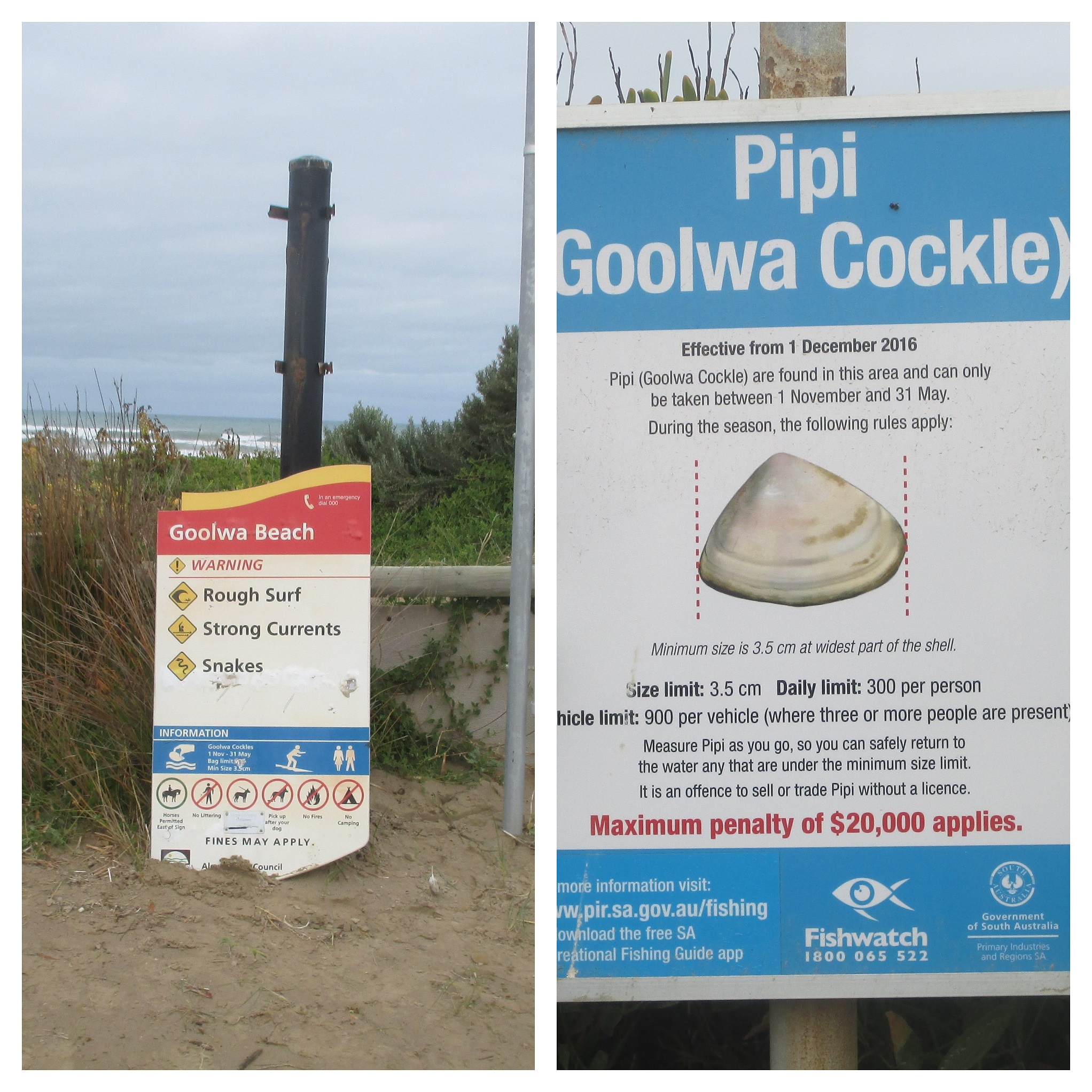Goolwa and the Goolwa pipi
By Judy Evans
@JudyEv (367630)
Rockingham, Australia
May 25, 2018 12:09am CST
Goolwa in South Australia is an historic river port on the Murray River. The name means ‘elbow’ in the local aboriginal dialect. We stayed with friends in nearby Adelaide and they took us to visit the town. It is a popular holiday resort and home to the PS (paddle steamer) Oscar W. On odd-numbered years the town hosts the South Australian Wooden Boat Festival. Goolwa is also a Cittaslow town and the first non-European town to gain Cittaslow status. I’ll do another post about that.
The left-hand sign is hardly conducive to having a pleasant day on the beach but maybe the locals are tough. The right-hand sign gives information about the harvesting of the Goolwa pipi or cockle. These were once collected purely as bait but are now considered a delicacy.
There are strict limits regarding their harvest and, as you can see, big penalties for those who err. Only certain sizes can be taken in certain areas and numbers are limited. The molluscs are enticed to the surface by gatherers doing the ‘cockle shuffle’. However there have been times when cockle-collecting had been banned due to the level of E. coli found in the cockles.
12 people like this
9 responses
@LadyDuck (489167)
• Italy
25 May 18
Cockles (as well as other bivalve) should never been eaten during the month without a "R". They are fine from September through April, this in our northern hemisphere. E.coli was common in the south of Italy during summer, because there they do not respect the rules and they eat raw mussels during hot months.
2 people like this

@epiffanie (11325)
• Australia
25 May 18
They should have this rules in the Philippines as well .. Over there, they get what ever they can get no matter what size of anything and sell them too ..
1 person likes this

@epiffanie (11325)
• Australia
27 May 18
@JudyEv Yes.. that is exactly what is happening there .. I think if no one buys those undersized catch, fishermen will put them back into the water ...
1 person likes this
@JudyEv (367630)
• Rockingham, Australia
27 May 18
@epiffanie They are obviously very serious about stopping illegal harvesting. That's a very hefty fine they're imposing.
1 person likes this

@topffer (42155)
• France
25 May 18
The left sign is not very encouraging. Seeing that horses are authorized I translate it by "Follow quickly your way, stranger, and don't turn over".
And a cockle called "pipi"  ? Hmm, it means wee in French, d*ck in Spanish, this one is not for me.
? Hmm, it means wee in French, d*ck in Spanish, this one is not for me.
 ? Hmm, it means wee in French, d*ck in Spanish, this one is not for me.
? Hmm, it means wee in French, d*ck in Spanish, this one is not for me.1 person likes this


@PatZAnthony (14749)
• Charlotte, North Carolina
26 May 18
Ewww-E.coli
Something to give one pause before they gather @JudyEv
1 person likes this
@JudyEv (367630)
• Rockingham, Australia
26 May 18
I would be avoiding the cockles all the time I think. What if the E.coli were early in arriving or whatever?
@JamesHxstatic (29410)
• Eugene, Oregon
27 May 18
That beach sounds a bit hazardous, especially the snake part! Have you eaten cockles before?
1 person likes this
@JudyEv (367630)
• Rockingham, Australia
27 May 18
Haha. Yes, I was thinking the non-Aussies' fears about Australia are only going to be reinforced by the sign.  I haven't eaten cockles and I don't think I'll bother. Who knows when the E coli might be present?
I haven't eaten cockles and I don't think I'll bother. Who knows when the E coli might be present?
 I haven't eaten cockles and I don't think I'll bother. Who knows when the E coli might be present?
I haven't eaten cockles and I don't think I'll bother. Who knows when the E coli might be present? @snowy22315 (200250)
• United States
25 May 18
I have never eaten wild clams (cockles) I always thought it would be fun to go to a clam bake though. I think that was the title of an Elvis Presley movie.
1 person likes this
@JudyEv (367630)
• Rockingham, Australia
26 May 18
I've never eaten clams either. At least I don't think I have.
@JohnRoberts (109842)
• Los Angeles, California
25 May 18
Snakes at the beach? There must be1000s of those cockles if a person can collect 300 daily.
1 person likes this















